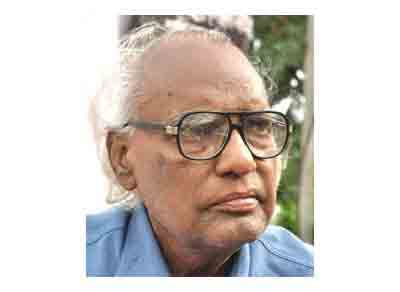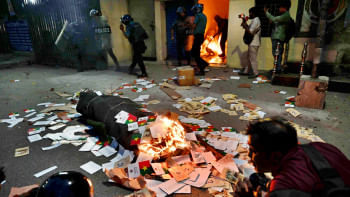<i>Faiz Ahmed passes away</i>

The Communist Manifesto had been Faiz Ahmed's constant company when he lived. The book lay by his pillow as he retired to bed every night.
And the book made it up to his coffin when his comrades, family members and well-wishers paid their last tributes to the veteran journalist, writer, litterateur and leading cultural activist.
Faiz Ahmed, a freedom fighter and veteran member of Communist Party of Bangladesh (CPB), breathed his last at a city hospital yesterday. He was 84.
He had been suffering from old age complications, including heart ailments. He was taken to Birdem Hospital with chest pain where doctors pronounced him dead around 5:30am, said Rumi Noman, a nephew of Faiz.
In accordance with his wishes, his eyes were donated to the voluntary organisation Sandhani and the body to Bangladesh Medical College.
The body was taken to Dhanmondi's Shilpangan Art Gallery, of which he was founding chairman, around 9:00am for people to pay their last respects.
Later around 11:30am, the coffin, wrapped with the CPB flag, was taken to the Jatiya Press Club where ministers, political leaders, journalists, cultural activists and people of different walks of life paid homage to the noted litterateur after his namaz-e-janaza.
His body was then taken to Aparajeyo Bangla of Dhaka University, where political leaders and cultural personalities stood in silence for a minute.
President Zillur Rahman and Prime Minister Sheikh Hasina have expressed their deep shock at his death.
“By uniting the political leaders and cultural activists, he taught us how to remain united,” said Nasiruddin Yousuf, noted cultural personality.
Faiz Ahmed was a devoted spirit in all popular struggles, starting from the language movement to the movement against the autocratic regime in the 1980s, said writer and journalist Shahriar Kabir.
Around 1:30pm, his body was taken before the CPB central office. CPB leaders were the first to place wreaths on his coffin, followed by other socio-political and cultural organisations and individuals, including language movement veterans Abdul Matin and Rawshan Ara Bacchu.
There he was accorded a guard of honour, his coffin draped in the national flag.
Faiz's niece Farhana Mithu said her uncle had always taught her to be a good human being and work for the welfare of the people.
Apart from The Communist Manifesto, Faiz used to keep Rabindranath Tagore's Sanchayeeta with him, she said, adding, “Just a few days ago, my uncle told me to keep The Communist Manifesto with me. From now on, I'll always keep it with me.”
The Communist Manifesto, originally titled Manifesto of the Communist Party, is an 1848 publication written by the German Marxist political theorists Karl Marx and Friedrich Engels.
It has since been recognised as one of the world's most influential political manuscripts.
CPB President Manzurul Ahsan Khan said Faiz fought for people's welfare throughout his life. “We'll carry forward his movement.”
His body was taken to Bangladesh Medical College around 3:45pm for donation.
Born at Basaildog village in Munshiganj on May 2, 1928, Faiz took up writing early in his life. In 1944, when he was only 16, his first essay Nam Bibhrat was published in Shishu Sawgat, according to the Gunijan, one of the largest electronic journals of Bangladeshi eminent personalities.
Son of Golam Mostafa Chowdhury, Faiz was the fifth among nine siblings. He took up journalism in 1948. In the years that followed, he became chief reporter of the Bangla dailies Ittefaq, Azad and Purbadesh.
He joined Radio Peking in 1966 to launch its Bangla programmes.
Faiz Ahmed's coverage of the proceedings of the Agartala Conspiracy Case between June 1968 and February 1969 are still regarded as some of the most incisive reports on the case.
He was also chief editor and managing director of the state-run news agency Bangladesh Sangbad Sangstha (BSS).
Faiz was also involved with cultural activities. He was the founder of Sammilito Sangskritik Jote. He was elected syndicate member of Dhaka University and Jahangirnagar University for three years each.
In 1960, he became a member of the undivided Communist Party.
A popular writer of fiction and rhymes for children, he wrote more than 100 books. Moddhorater Oshshorohi (The midnight horse rider) is one of his famous books.
He received the Ekushey Padak, Bangla Academy Padak and Shishu Academy Award for his journalistic excellence and contributions to society and literature.

 For all latest news, follow The Daily Star's Google News channel.
For all latest news, follow The Daily Star's Google News channel. 



Comments